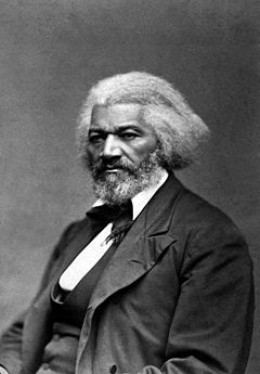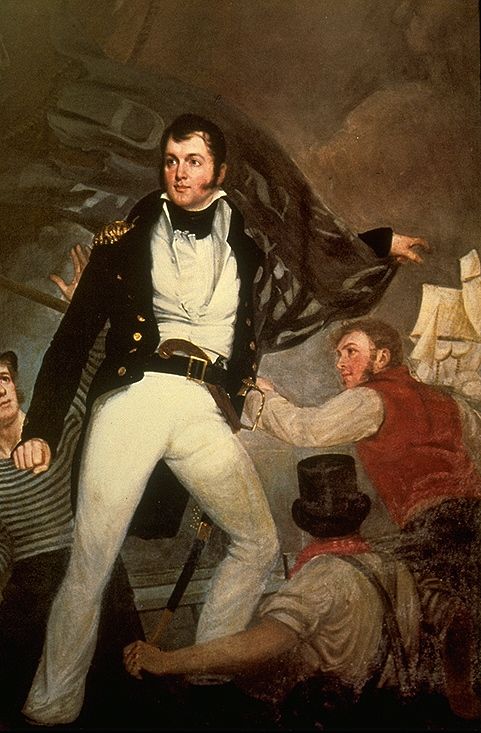The Civil Radical Battles of the Black American Soldier
How many Black American soldiers fought in ww1?
True Sons Of Freedom
More than 350,000 African Americans served in segregated units during World War I, mostly as support troops. Several units saw action alongside French soldiers fighting against the Germans, and 171 African Americans were awarded the French Legion of Honor.
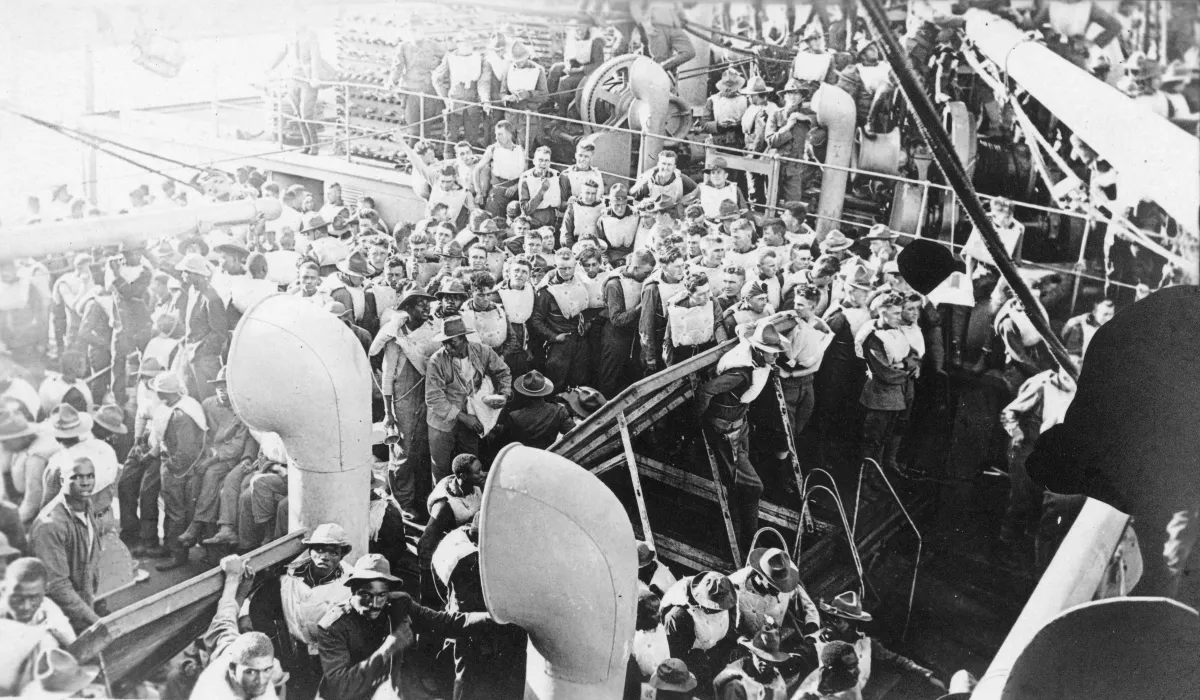
Caucasian and African-American soldiers aboard a United States Navy vessel during World War 1, 1918. (Photo by JHU Sheridan Libraries/Gado/Getty Images).
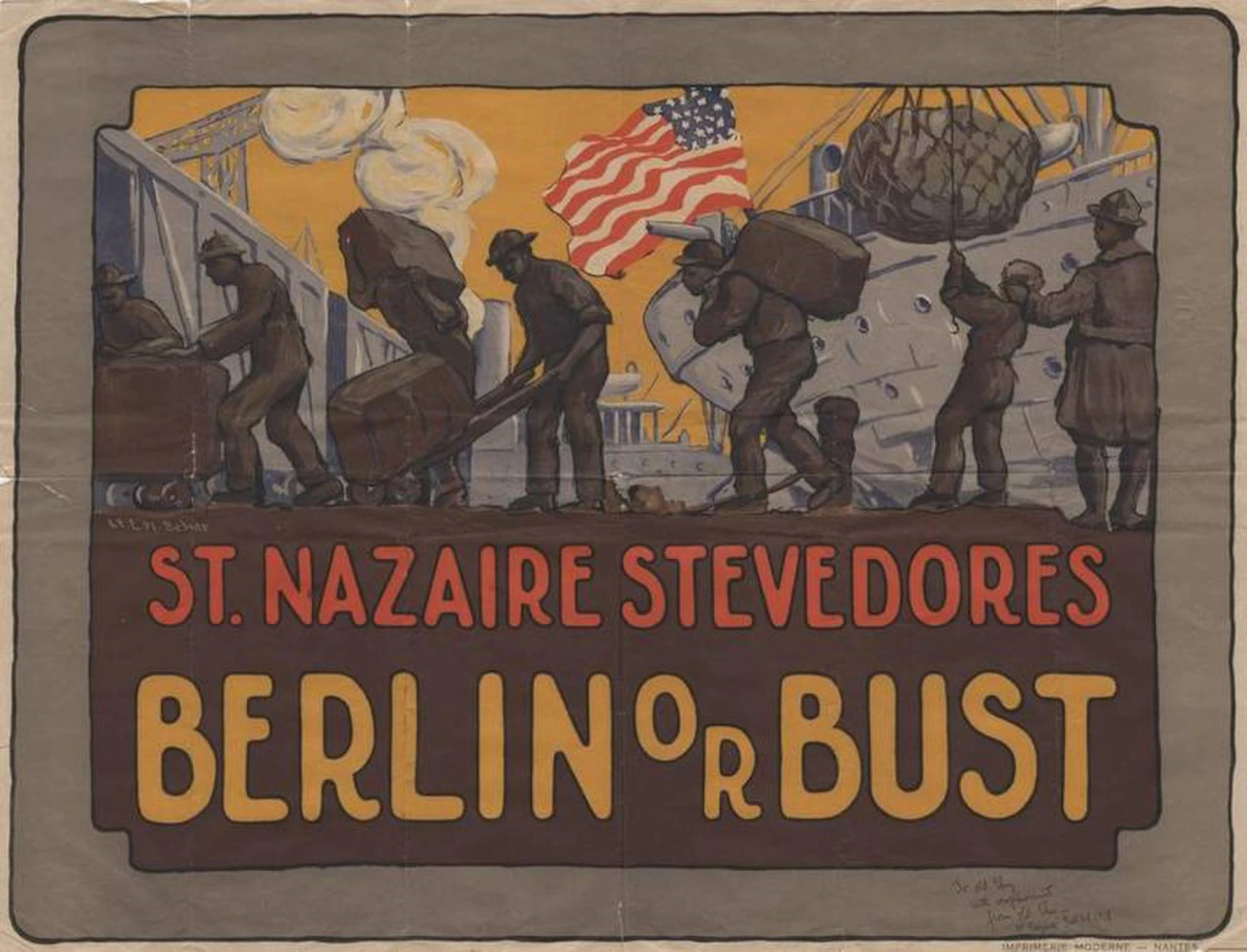
A military poster promoting the work of stevedores at the St. Nazaire port of debarkation for American Expeditionary Forces during World War I in France in 1918. The African-American 369th Infantry Regiment arrived at St. Nazaire in December 1917 and performed labor duties before their onward integration and training for combat under French command in March 1918. Photo courtesy of the National World War I Museum and Memorial
Photo By: National World War I Museum and Memorial
What were Black soldiers called in WW1?
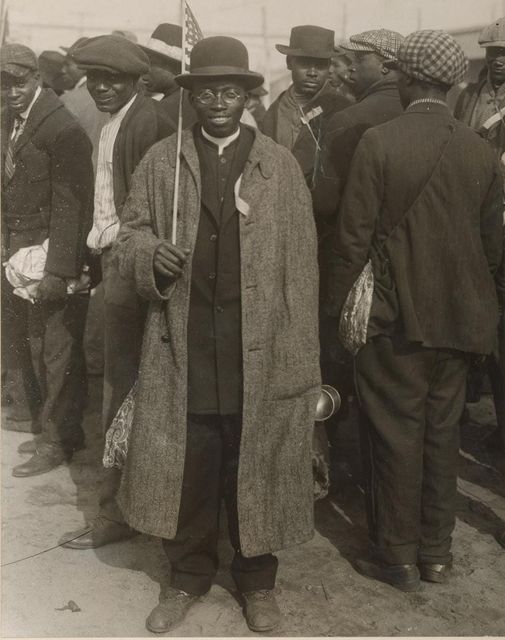
Shelton Smith reporting to Camp Devens Ayer, Massachusetts (1917)
Public Domain
Boston, Massachusetts – 54th Regiment
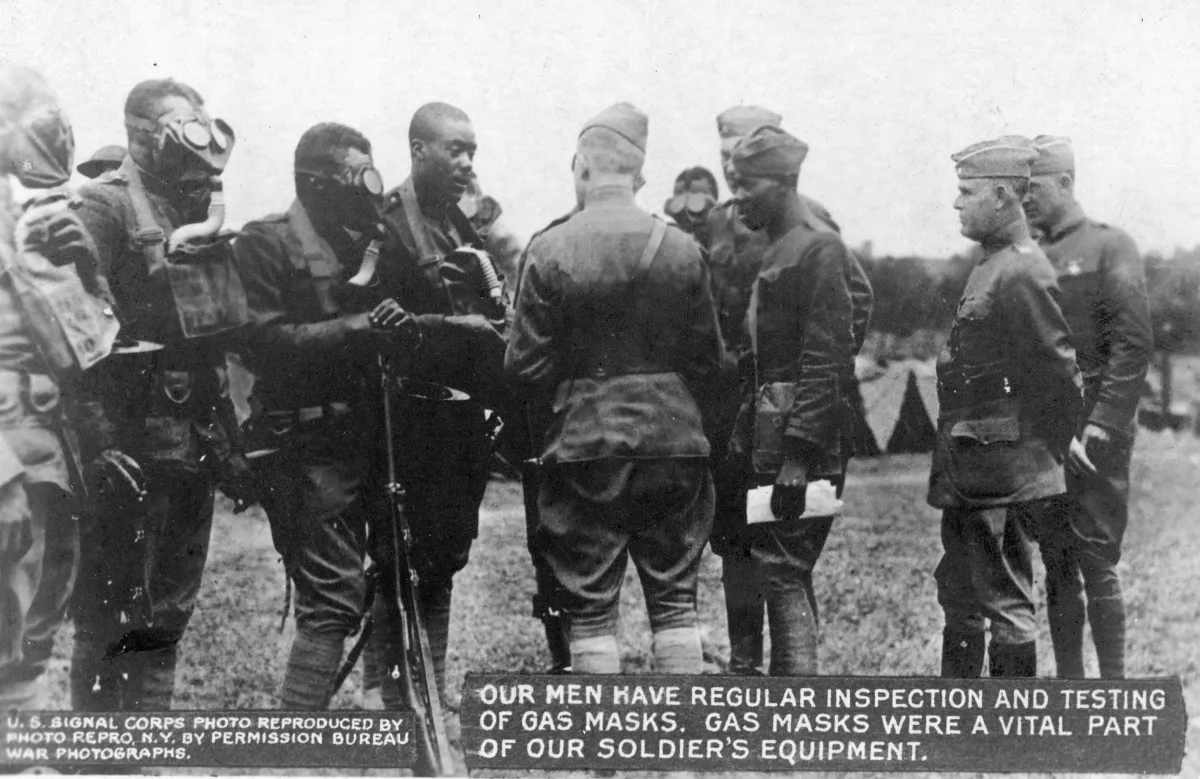
World War 1 US Signal Corps members performing regular inspection and testing of gas masks; African American soldiers standing around higher ranked officers wearing gas masks, 1917. (Photo by JHU Sheridan Libraries/Gado/Getty Images).
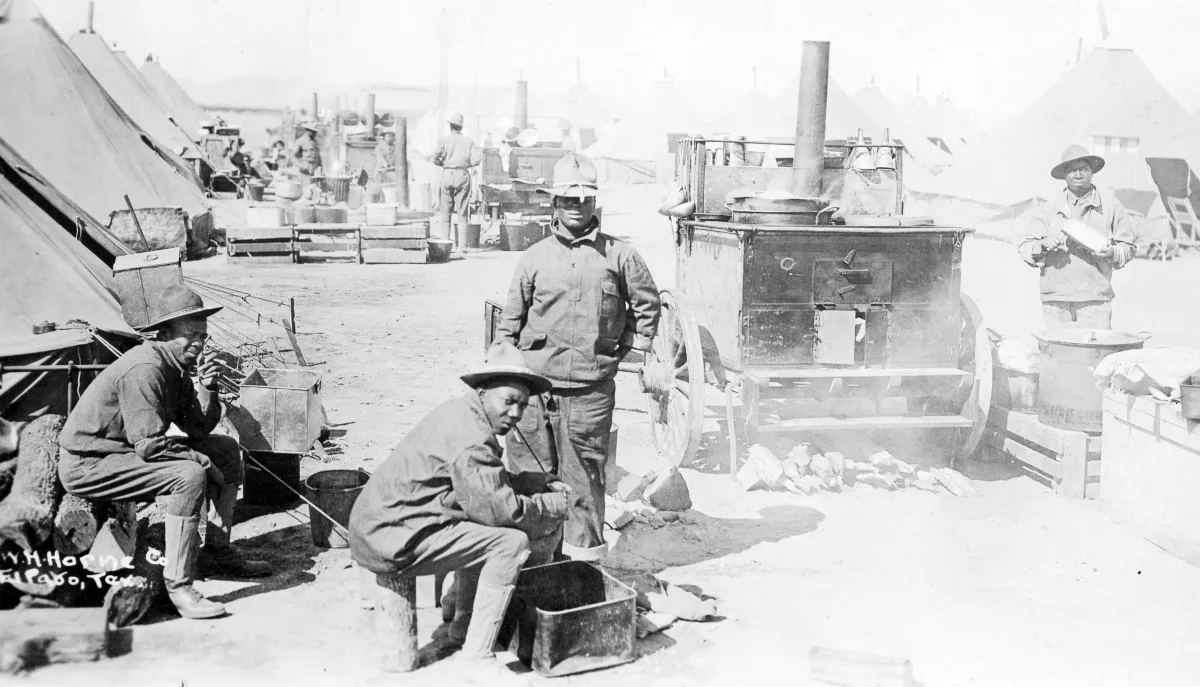
African American soldiers in World War I, four men, two seated, two standing, all wearing uniforms, facing the camera and using cooking equipment, neutral facial expressions, 1917. (Photo by JHU Sheridan Libraries/Gado/Getty Images).
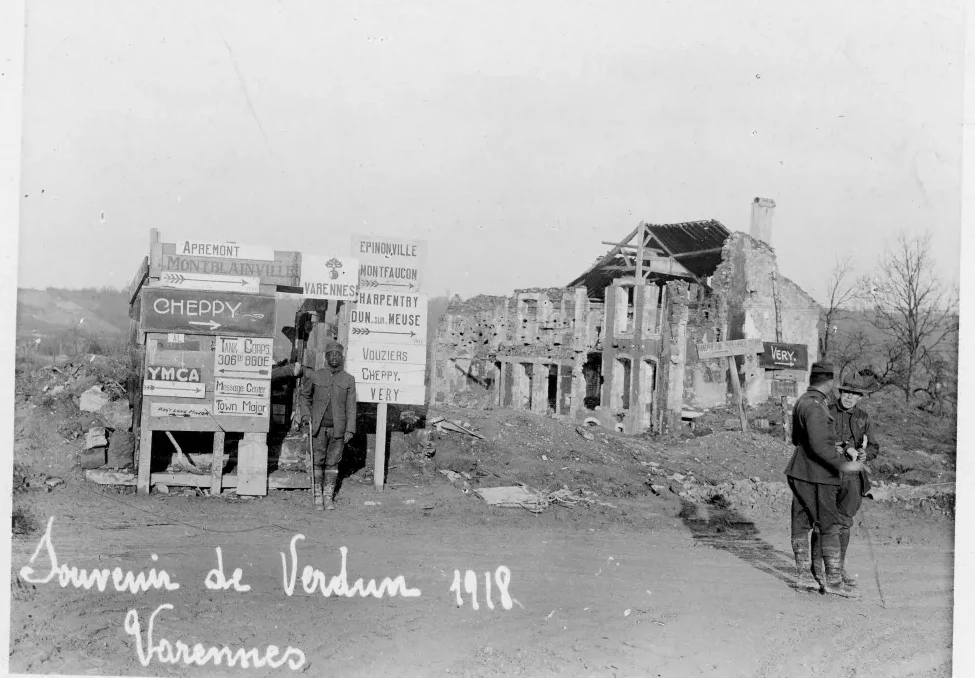
African American soldier standing in front of a board of signs in Cheppy, France after the Battle of Verdun that took place during World War I, two military men are standing to the side, there is a crumbling building in the background, France, 1918. (Photo by JHU Sheridan Libraries/Gado/Getty Images).

Negro troops in France. Part of the 15th Regiment Infantry, New York National Guard organized by Colonel Haywood, which has been under fire, ca. 1918. (Photo by © CORBIS/Corbis via Getty Images)
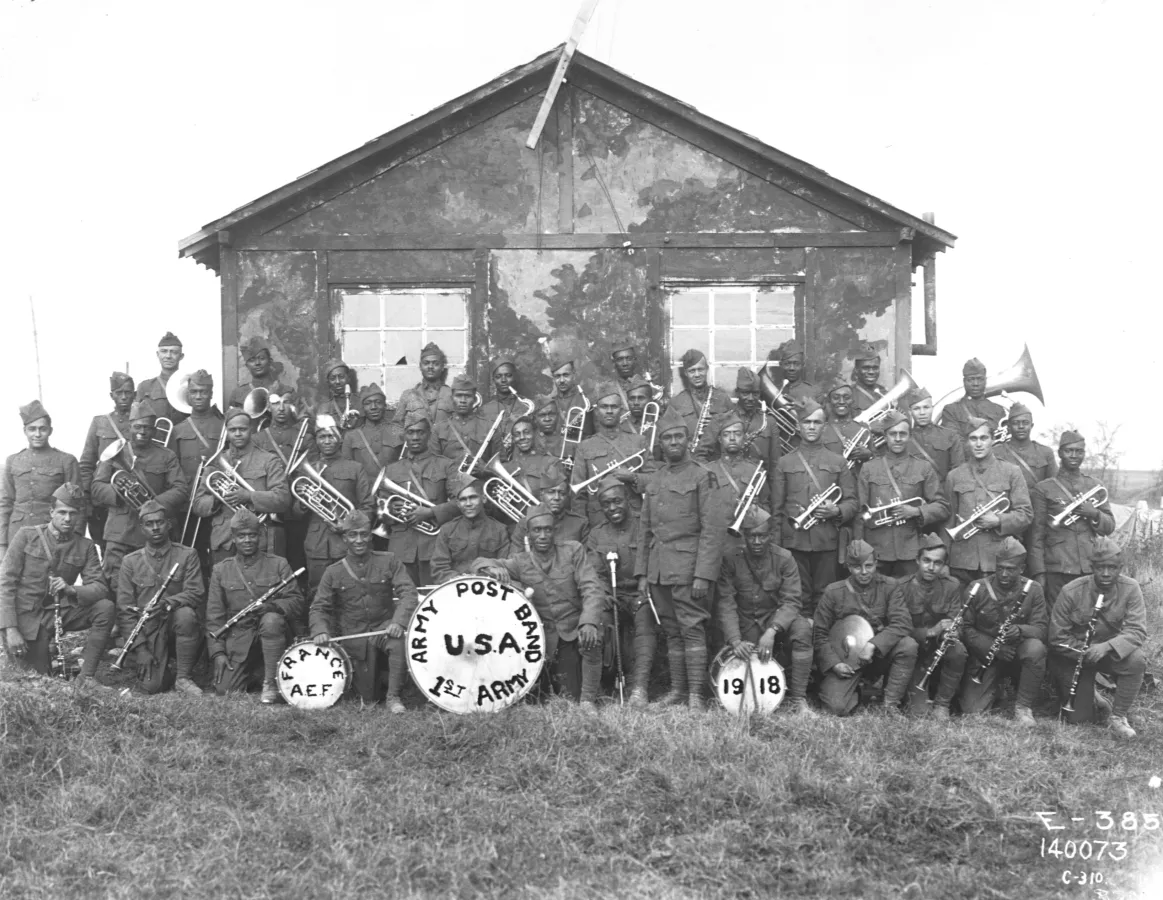
1st Army Post Band (Colored) — Souilly, France, 1918. | Location: Souilly, France. (Photo by © CORBIS/Corbis via Getty Images)
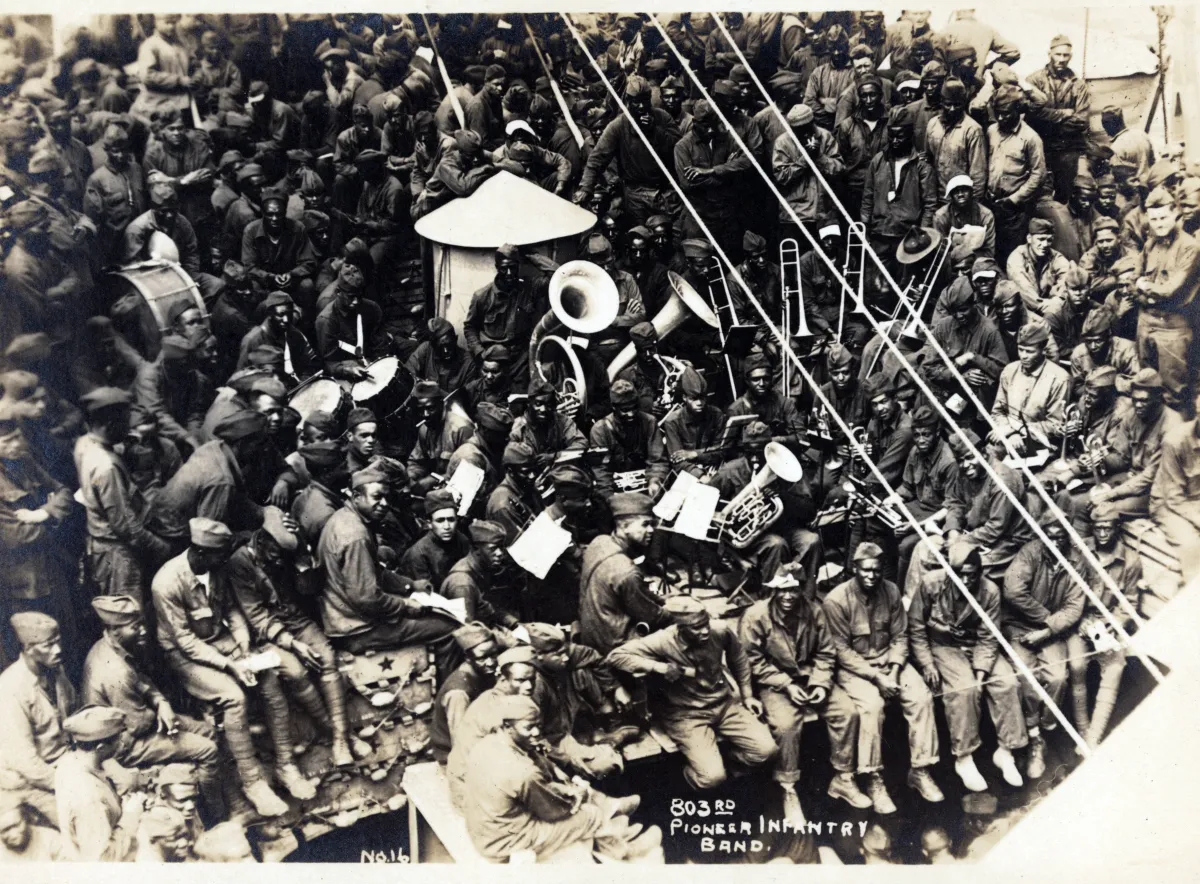
African American band members on the U.S.S. Philippine, during the voyage to the United States from Brest, France, 1919. (Photo by: Photo12/UIG via Getty Images)
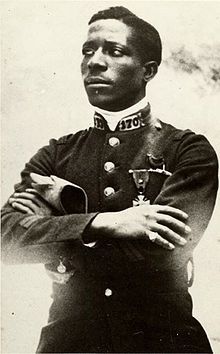
Eugene Bullard – The First African-American Combat Pilot Was a Hero in France But Forgotten in the U.S.
“Despite his acclaim in France, Bullard received virtually no recognition in America.”
EUGENE JACQUES BULLARD may have been the 6,950th French military pilot to earn his wings during World War One, but he’s remembered as history’s very first African-American aviator.
The 21-year-old volunteer graduated from flight training on May 5, 1917, after spending more than 12 harrowing months fighting in the French army on the Western Front. One of nearly 300 U.S. citizens to serve in France’s burgeoning air corps before America entered into the war, Bullard was eventually assigned to the famous Lafayette Flying Corps. During his career as a fighter pilot, the Georgia native reportedly brought down two German aircraft, however, these victories remain unconfirmed. Although never earning the distinction of “ace,” Bullard still won many of his adopted country’s highest military decorations including the Légion d’honneur, the Médaille Militaire, and the Croix de Guerre.
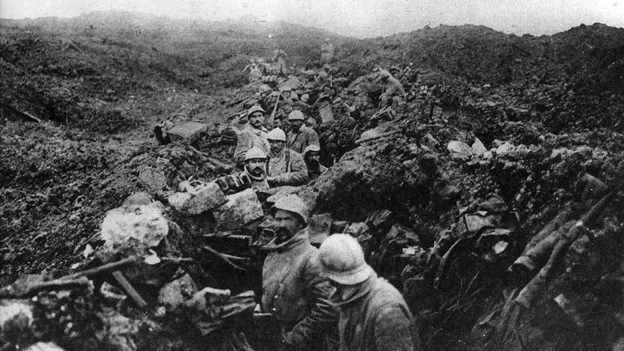
Before earning his wings, Bullard fought in the hell that was Verdun.
After the war, he would become close friends with flying legend Charles Nungesserand and Jazz luminary Louis Armstrong. Yet despite his acclaim in France, Bullard received virtually no recognition in America. Worse, after returning to the U.S. as a wounded combat veteran and an aviation trailblazer, he died penniless in obscurity.
The War Years
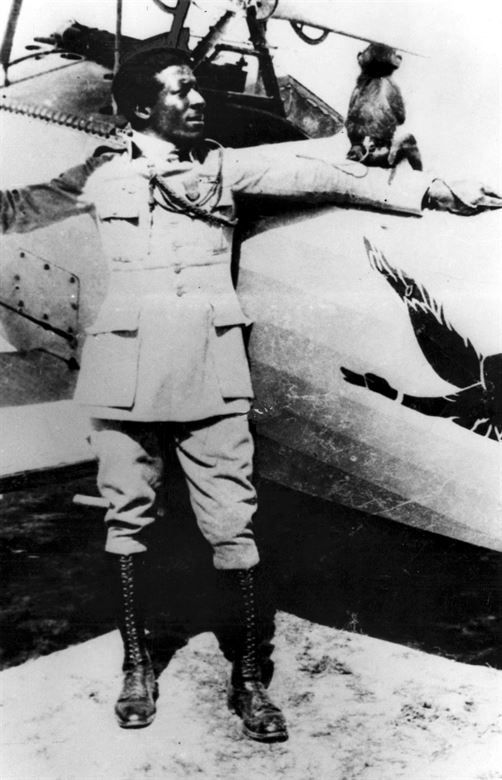
Eugene Jacques Bullard
America’s First Black Military Aviator
Bullard, who was also part Creek Indian, knew the sting of racism at a young age. One of 10 children, he claimed to have once seen his father set upon by a mob of Whites and almost lynched. [1] Upon reaching his teens, young Eugene left behind a life of racial segregation and hopped a trans-Atlantic steamer bound for Europe. He eventually landed in Paris where he made a living as a prizefighter.
Within weeks of Germany’s 1914 invasion of France, Bullard enlisted. Like other non-French volunteers, he was assigned to a Foreign Legion regiment where he served with distinction as a machine gunner in action at Picardy, Artois, and Champagne. During 1915, his 23,000-man unit was decimated, suffering more than 50 percent casualties. [2] Still standing, Eugene was transferred to the celebrated 170th Infantry Regiment and sent into battle at Verdun. Wounded in the opening weeks of the epic 10-month clash, Bullard was pulled from the line to recuperate.
In October of 1916, Bullard signed on with the French Air Service and began flight training. By the following year, he was piloting Spads and Nieuports with the 93rd Escadrille against German warplanes over the Verdun sector.
A capable aviator, Eugene quickly earned the nickname the “Black Swallow of Death” (an homage to his former regiment, the 170th known as Les Hirondelles de la Mort). Heralded as one of the only black pilots of the war (and a decorated one at that), he enjoyed considerable notoriety in the French press.
Following America’s entry to the war, Bullard applied for a transfer to the nascent U.S. Army flying corps that was assembling in France. Despite his ample combat experience, the American military rejected him based on his race.
Eugene continued to fly with the French Air Service but was eventually returned to the infantry after striking a superior officer while on leave. He served out the war in the rear echelon with his old unit, the 170th.
After the War
Following the Armistice, Bullard worked as a jazz drummer in a popular Parisian nightclub. Later he opened his tavern. He named it L’Escadrille about his wartime flying. Jazz legends and celebrities alike frequented the club. In the 1920s, Bullard married into a wealthy French family and had two children. The marriage ended in 1935.
In 1939, Eugene offered his services to France again, this time recording the comings and goings of his nightclub’s German patrons. When Hitler’s Panzers rolled into France in May of 1940, the middle-aged Bullard again answered the call. He joined the French Army in time to see action but was grievously wounded in the defence of Orleans. As the country fell to the Nazis, Bullard was evacuated to Spain and was eventually repatriated to the United States.
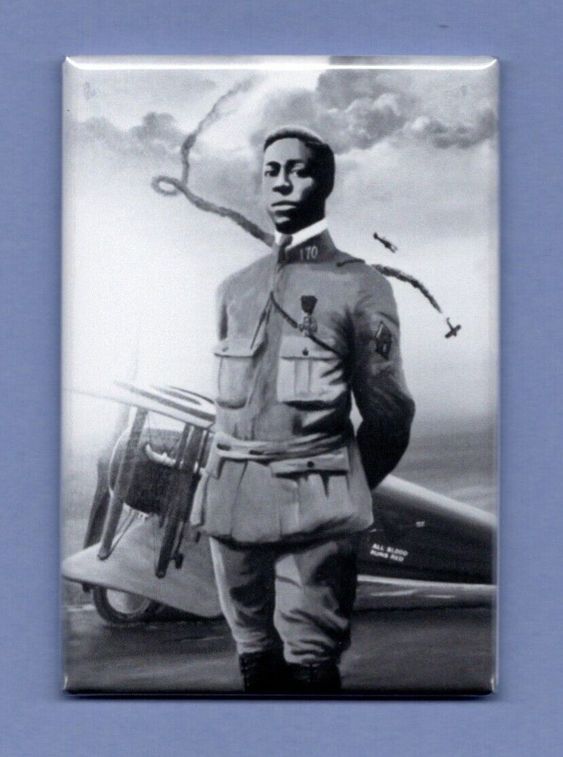
Acclaimed Fighters
“Their value was not lost on the French, and the regiment continued to fight alongside French forces, participating in the Aisne-Marne counteroffensive in the summer of 1918 alongside the French 162nd Infantry Division.
The Hell Fighters from Harlem had come into their own, despite their difficult start.
The regiment would go on to prove itself in combat operations throughout the rest of the war, receiving France’s highest military honor, the Croix de Guerre, for its unit actions alongside some 171 individual decorations for heroism.
During the World War I centennial observance, the New York National Guard and New York State Division of Military and Naval Affairs will issue press releases noting key dates that affected New Yorkers, based on information and artifacts provided by the New York State Military Museum here.
More than 400,000 New Yorkers served in the military during World War I, more than any other state.“
How were African American soldiers treated?
What problem did returning African-American soldiers face after World War 1?
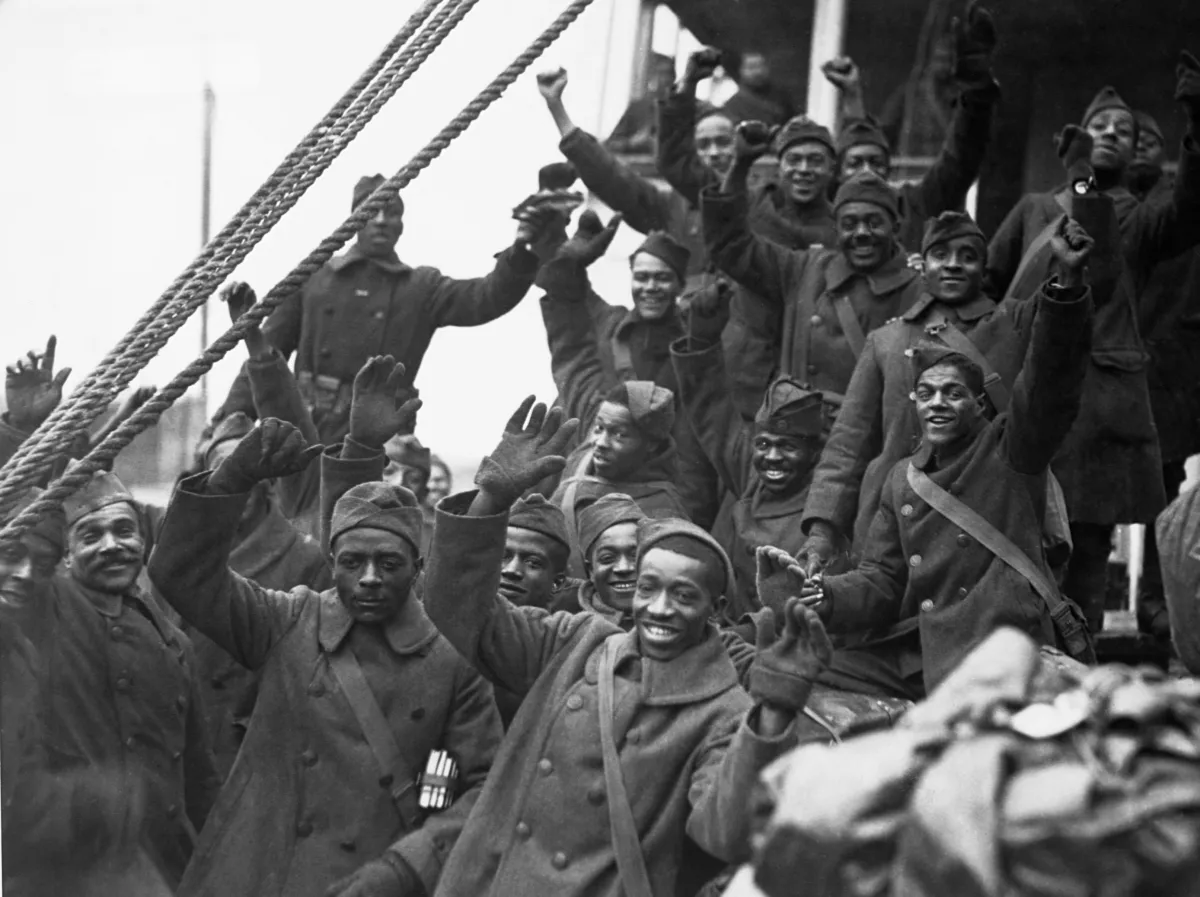
Members of the famous 369th Colored Infantry, formerly 15th N.Y. regulars, arrive in New York City. ‘Back to little old New York.’ 1919. (Photo by © CORBIS/Corbis via Getty Images)
How many Black soldiers died in ww1?
THE CIVIL WAR
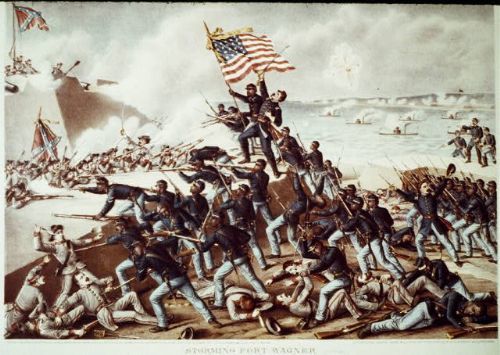
The American Civil War is arguably the most gruesome and brutal in United States history. Brothers fought against brothers, fathers fought against sons, and through this terrible conflict, people were finally granted freedom. Though the war started with the goal of restoring the “Union,” what history remembers is that Slavery was finally put to an end.
Everyone knows of Lincoln’s famous Gettysburg Address, the Emancipation Proclamation, Abolitionists like Frederick Douglass, and even the 14th and 15th Amendments, but few recognize another important part of the Civil War, the brave African American men who gave their lives in the pursuit of freedom for their people.
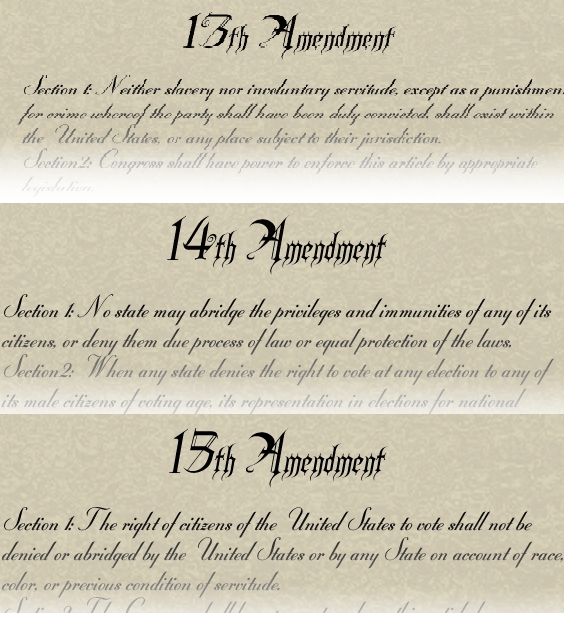
The 13th Amendment abolished slavery. The 14th Amendment gave citizenship to all people born in the US.
The 15th Amendment gave Black Americans the right to vote.
The former slave became a famed abolitionist. Called on Blacks to serve in the Union Army as it would be the best path to citizenship
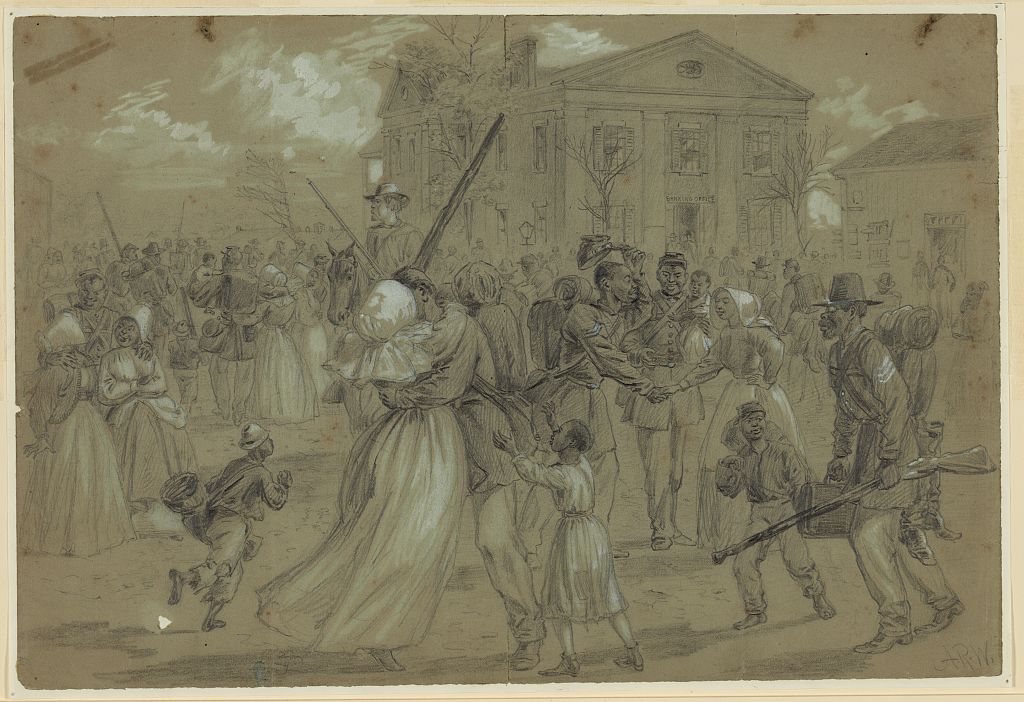
“African American soldiers mustered out at Little Rock, Arkansas,” Waud, Alfred R., Artist. 1866. Photograph (LOC)
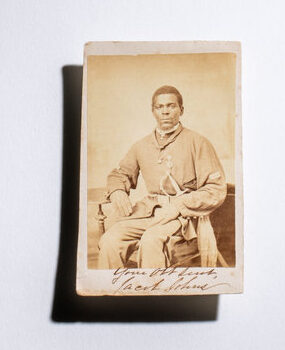
Erica Deeman for The New York Times. An object from the Smithsonian’s National Museum of African American History and Culture.
Enlisting in a Moral Fight
It is unclear whether Jacob Johns was enslaved, recently freed or a free man when he enlisted in the Union Army as a sergeant in the 19th United States Colored Troops Infantry, Company B. His unit fought in 11 battles, and 293 of its men were killed or died of disease, including Johns. When the war began in 1861, enslaved African Americans seized their opportunity for freedom by crossing the Union Army lines in droves. The Confederate states tried to reclaim their human “property” but were denied by the Union, which cleverly declared the formerly enslaved community as contraband of war — captured enemy property. President Abraham Lincoln initially would not let Black men join the military, anxious about how the public would receive integrated efforts. But as casualties increased and manpower thinned, Congress passed the Second Confiscation and Militia Act in 1862, allowing Lincoln to “employ as many persons of African descent” as he needed, and thousands enlisted in the United States Colored Troops. Jacobs was one of nearly 180,000 Black soldiers who served in the U.S.C.T. during the Civil War, a group that made up nearly one-tenth of all soldiers, fighting for the cause of freedom.
**~**
11 FACTS ABOUT MILITARY DISCRIMINATION
- In 2011, the US lifted the “Don’t Ask, Don’t Tell” policy, which restricted gay, lesbian, and bisexuals from openly serving in the military. For the first time in American history, people of every sexual orientation could serve openly and proudly.
- Under “Don’t Ask, Don’t Tell,” between 1993 and 2011, over 14,000 military men and women were discharged due to their sexual preference. Each discharge cost the US roughly $50,000.
- There have been 150,000 people who are transgender who have served in the US armed forces.
- People who are transgender are not issued the same freedom as Gay, Lesbian, and Bisexual service members because of discriminatory medical regulations that label them as mentally unstable.
- In 2010, roughly 19,000 sexual assaults occurred in the military, and a little less than 14% of these were reported by survivors.
- MST (Military Sexual Trauma) is the leading cause of PTSD (Post-Traumatic Stress Disorder) in women, while combat trauma is the leading cause for men.
- Mental health issues like depression and stress that occur after sexual harassment make veterans highly subject to substance abuse and unemployment.
- Only 3% of white officers report racial discrimination in the military, compared to 27% of both black and Hispanic officers.
- 22% of white soldiers, 19% of Hispanic soldiers, and 24% of Black soldiers report experiencing racial discrimination within their current unit.
- Black people could serve in the military as early as the 18th century, but it wasn’t until 1948 that the troops were racially integrated.
- Genetic discrimination is banned in most American workplaces, but the military is allowed to discriminate based on congenital or hereditary conditions.
“MEN OF COLOR, TO ARMS!”
“When first the rebel cannon shattered the walls of Sumter and drove away its starving garrison, I predicted that the war then and there inaugurated would not be fought out entirely by White men. Every month’s experience during these dreary years has confirmed that opinion. A war was undertaken and brazenly carried on for the perpetual enslavement of Colored men calling logically and loudly for colored men to help suppress it. Only a moderate share of sagacity was needed to see that the arm of the slave was the best defense against the arm of the slaveholder. Hence with every reverse to the national arms, with every exulting shout of victory raised by the slaveholding rebels, I have implored the imperiled nation to unchain against her foes, her powerful Black hand. Slowly and reluctantly that appeal is beginning to be heeded. Stop not now to complain that it was not heeded sooner. It may or may not have been best that it should not. This is not the time to discuss that question. Leave it to the future. When the war is over, the country is saved, peace is established, and the Black man’s rights are secured, as they will be, history with an impartial hand will dispose of that and sundry other questions. Action! Action! not criticism is the plain duty of this hour. Words are now useful only as they stimulate to blows. The office of speech now is only to point out when, where, and how to strike to the best advantage. There is no time to delay. The tide is at its flood that leads to fortune. From East to West, from North to South, the sky is written all over, “Now or never.” Liberty won by White men would lose half its luster. “Who would be free themselves must strike the blow.” “Better even die free, than to live slaves.” This is the sentiment of every brave Colored man amongst us. There are weak and cowardly men in all nations. We have them amongst us. They tell you this is the “White man’s war”; and you will be “no better off after than before the war”; and that the getting of you into the army is to “sacrifice you on the first opportunity.” Believe them not; cowards themselves, they do not wish to have their cowardice shamed by your brave example. Leave them to their timidity, or to whatever motive may hold them back. I have not thought lightly of the words I am now addressing you. The counsel I give comes from close observation of the great struggle now in progress, and of the deep conviction that this is your hour and mine. In good earnest then, and after the best deliberation, I now for the first time during this war feel at liberty to call and counsel you to arms. By every consideration which binds you to your enslaved fellow—countrymen, and the peace and welfare of your country; by every aspiration which you cherish for the freedom and equality of yourselves and your children; by all the ties of blood and identity which make us one with the brave black men now fighting our battles in Louisiana and South Carolina, I urge you to fly to arms, and smite with death the power that would bury the government and your liberty in the same hopeless grave. I wish I could tell you that the State of New York calls you to this high honor. For the moment her constituted authorities are silent on the subject. They will speak by and by, and doubtless on the right side, but we are not compelled to wait for her. We can get at the throat of treason and slavery through the State of Massachusetts. She was the first in the War of Independence; first to break the chains of her slaves; first to make the black man equal before the law; first to admit colored children to her common schools, and she was first to answer with her blood the alarm cry of the nation when its capital was menaced by rebels. You know her patriotic governor, and you know Charles Sumner. I need not add more.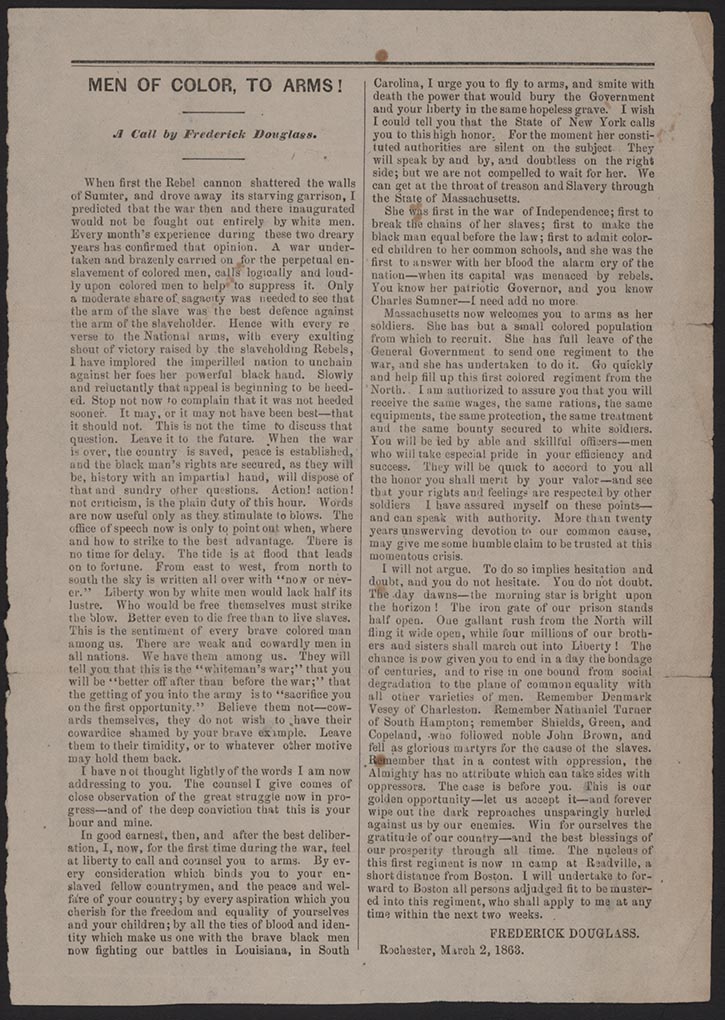 Massachusetts now welcomes you to arms as soldiers. She has but a small colored population from which to recruit. She has full leave of the general government to send one regiment to the war, and she has undertaken to do it. Go quickly and help fill up the first Colored regiment from the North. I am authorized to assure you that you will receive the same wages, the same rations, the same equipment, the same protection, the same treatment, and the same bounty, secured to the White soldiers.
You will be led by able and skillful officers, men who will take special pride in your efficiency and success. They will be quick to accord to you all the honor you shall merit by your valor, and see that your rights and feelings are respected by other soldiers. I have assured myself of these points and can speak with authority. More than twenty years of unswerving devotion to our common cause may give me some humble claim to be trusted at this momentous crisis. I will not argue. To do so implies hesitation and doubt, and you do not hesitate. You do not doubt. The day dawns; the morning star is bright upon the horizon! The iron gate of our prison stands half-open. One gallant rush from the North will fling it wide open, while four million of our brothers and sisters shall march out into liberty.
The chance is now given to you to end in a day the bondage of centuries, and to rise in one bond from social degradation to the place of common equality with all other varieties of men. Remember Denmark Vesey of Charleston; remember Nathaniel Turner of Southampton; remember Shields Green and Copeland, who followed noble John Brown, and fell as glorious martyrs for the cause of the slave. Remember that in a contest with oppression, the Almighty has no attribute that can take sides with oppressors.
The case is before you. This is our golden opportunity. Let us accept it, and forever wipe out the dark reproaches unsparingly hurled against us by our enemies. Let us win for ourselves the gratitude of our country, and the best blessings of our posterity through all time. The nucleus of this first regiment is now in camp at Readville, a short distance from Boston. I will undertake to forward to Boston all persons adjudged fit to be mustered into the regiment, who shall apply to me at any time within the next two weeks.
Massachusetts now welcomes you to arms as soldiers. She has but a small colored population from which to recruit. She has full leave of the general government to send one regiment to the war, and she has undertaken to do it. Go quickly and help fill up the first Colored regiment from the North. I am authorized to assure you that you will receive the same wages, the same rations, the same equipment, the same protection, the same treatment, and the same bounty, secured to the White soldiers.
You will be led by able and skillful officers, men who will take special pride in your efficiency and success. They will be quick to accord to you all the honor you shall merit by your valor, and see that your rights and feelings are respected by other soldiers. I have assured myself of these points and can speak with authority. More than twenty years of unswerving devotion to our common cause may give me some humble claim to be trusted at this momentous crisis. I will not argue. To do so implies hesitation and doubt, and you do not hesitate. You do not doubt. The day dawns; the morning star is bright upon the horizon! The iron gate of our prison stands half-open. One gallant rush from the North will fling it wide open, while four million of our brothers and sisters shall march out into liberty.
The chance is now given to you to end in a day the bondage of centuries, and to rise in one bond from social degradation to the place of common equality with all other varieties of men. Remember Denmark Vesey of Charleston; remember Nathaniel Turner of Southampton; remember Shields Green and Copeland, who followed noble John Brown, and fell as glorious martyrs for the cause of the slave. Remember that in a contest with oppression, the Almighty has no attribute that can take sides with oppressors.
The case is before you. This is our golden opportunity. Let us accept it, and forever wipe out the dark reproaches unsparingly hurled against us by our enemies. Let us win for ourselves the gratitude of our country, and the best blessings of our posterity through all time. The nucleus of this first regiment is now in camp at Readville, a short distance from Boston. I will undertake to forward to Boston all persons adjudged fit to be mustered into the regiment, who shall apply to me at any time within the next two weeks.
What it was like for Black American soldiers during the Civil War and the events of the War that defined them?
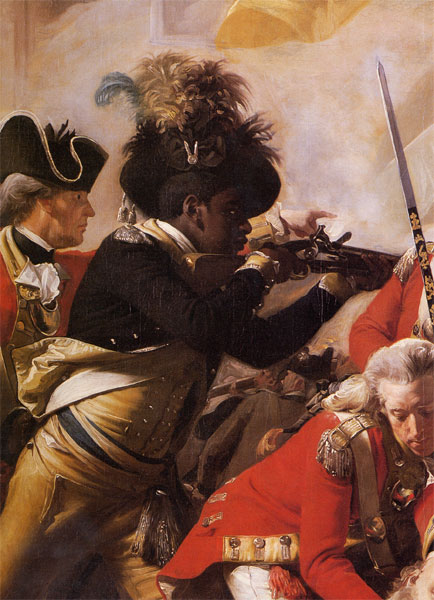
What risks did African American soldiers face if they were captured in the South?
Black American soldiers had been around long before the outbreak of the Civil War. During the Revolutionary War, slaves joined up where they could to fight for this vision of freedom their masters spoke so highly of, hoping they too could earn their freedom. Originally George Washington and other leaders in the Continental Army did not want slaves fighting with them on the battlefields of the colonies. Washington admitted to making the War about freedom from England, not about slavery. He feared if he got the concept of slavery involved, we would lose support from some of the southern colonies. The British on the other hand had no such fear. They welcomed the use of slaves to fight and even promised a deal of freedom with service.
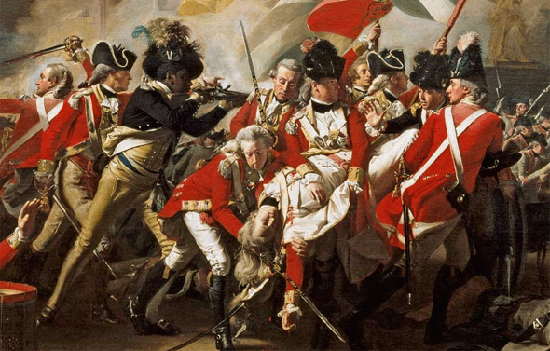
”In November 1775 Lord Dunmore, royal governor of Virginia issued a
proclamation promising freedom for any enslaved black in Virginia who
joined the British army. Within a month, nearly three hundred slaves
had joined what would be known as “Lord Dunmore’s Ethiopian Regiment.”
Later, thousands of slaves fled plantations for British promises of
emancipation. At the end of the war, the British kept their word, to
some at least, and evacuated as many as fourteen thousand “Black
Loyalists” to Nova Scotia, Jamaica, and England.”
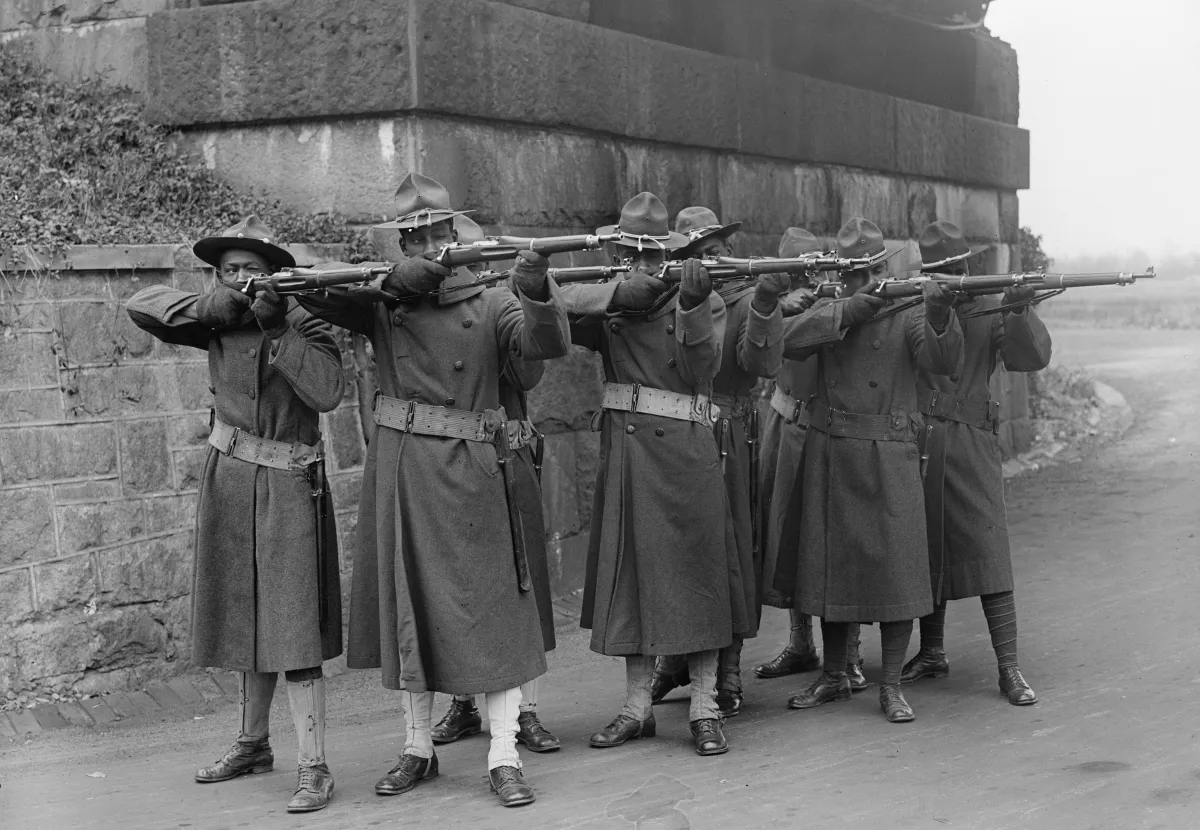
African-American Troops, World War I, circa 1917. (Photo by: Universal History Archive/UIG via Getty Images)
What did the Confederacy threaten to do to Black soldiers if they were captured?
It was the British Governor of Virginia, Dunmore, who first proposed this idea. He promised freedom to his slaves for whoever would join up with the British to fight the colonial traitors. The first group of slaves to be drafted became known as the Ethiopian regiment. To compete with this, the Continental Army quickly changed its policy and began its recruitment of slaves, with a similar promise of freedom with service. After the war was over, however, Congress passed the Militia Act of 1776, which banned all African American slaves, or otherwise from joining the armed forces (Creating Black Americans). Black American soldiers were also present during the War of 1812. The War of 1812 was the second conflict with the Royal Crown of England and saw the burning of Washington D.C. as well as Baltimore. At this time fifteen percent of the U.S. Navy consisted of Black sailors. Though the official policy was to deny these men from entry into any armed forces, the need for manpower usually undermined this rule.
In addition, Black sailors were known as being among the fiercest fighters, so they were often recruited.
Captain Oliver Perry was a U.S. Naval Captain who strongly opposed the use of Black sailors. He often complained about the use of them on his ship, but after the battle of Lake Erie, he changed his stance. During the battle, during which Perry’s fleet was able to best the British, his Black sailors performed so well that he wrote the Secretary of the Navy praising them on their bravery. These acts would later lead the Black American soldiers into the greatest moments of their career, the Civil War.
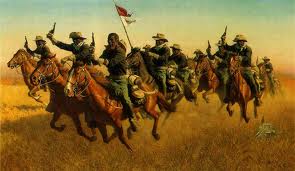
As the North became increasingly more industrialized, leaving the South to tend to the agriculture of the economy, tensions began to rise between the two. The argument between Slave and Free states only added to this growing conflict. In 1832, Southern states tried their first hand at secession, then again in 1850.

